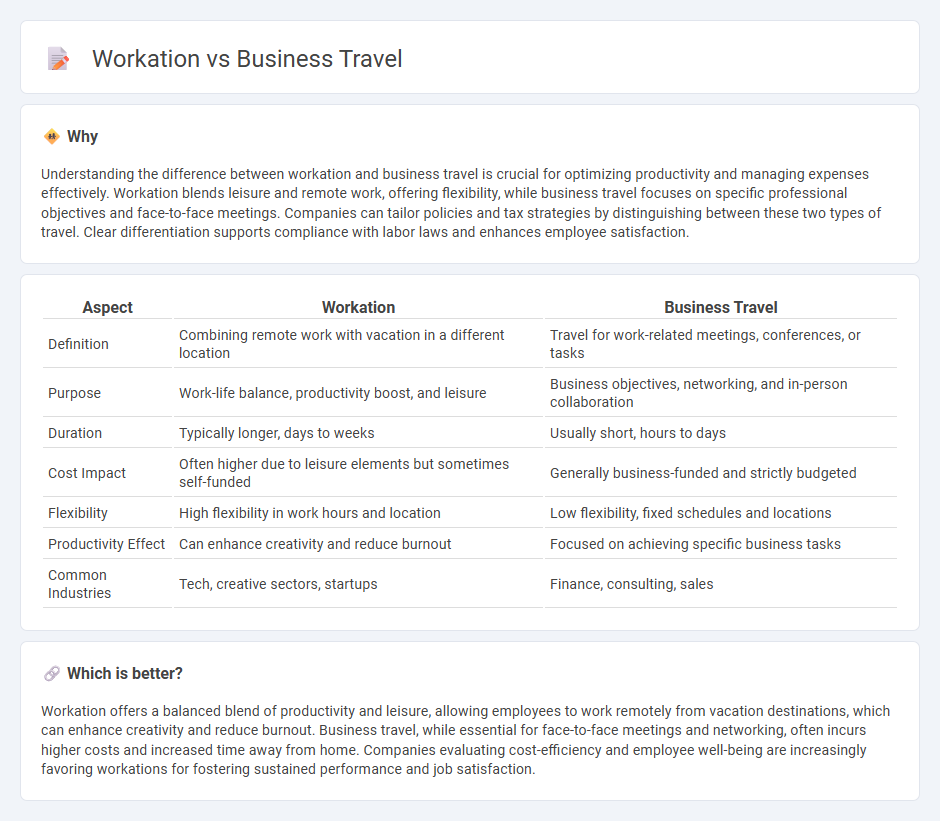
Workation combines remote work with leisure travel, boosting employee productivity and well-being while stimulating local economies. Business travel traditionally focuses on in-person meetings and networking, often incurring higher costs and carbon footprints. Explore how the shift toward workation is transforming economic patterns and corporate strategies.
Why it is important
Understanding the difference between workation and business travel is crucial for optimizing productivity and managing expenses effectively. Workation blends leisure and remote work, offering flexibility, while business travel focuses on specific professional objectives and face-to-face meetings. Companies can tailor policies and tax strategies by distinguishing between these two types of travel. Clear differentiation supports compliance with labor laws and enhances employee satisfaction.
Comparison Table
| Aspect | Workation | Business Travel |
|---|---|---|
| Definition | Combining remote work with vacation in a different location | Travel for work-related meetings, conferences, or tasks |
| Purpose | Work-life balance, productivity boost, and leisure | Business objectives, networking, and in-person collaboration |
| Duration | Typically longer, days to weeks | Usually short, hours to days |
| Cost Impact | Often higher due to leisure elements but sometimes self-funded | Generally business-funded and strictly budgeted |
| Flexibility | High flexibility in work hours and location | Low flexibility, fixed schedules and locations |
| Productivity Effect | Can enhance creativity and reduce burnout | Focused on achieving specific business tasks |
| Common Industries | Tech, creative sectors, startups | Finance, consulting, sales |
Which is better?
Workation offers a balanced blend of productivity and leisure, allowing employees to work remotely from vacation destinations, which can enhance creativity and reduce burnout. Business travel, while essential for face-to-face meetings and networking, often incurs higher costs and increased time away from home. Companies evaluating cost-efficiency and employee well-being are increasingly favoring workations for fostering sustained performance and job satisfaction.
Connection
Workation and business travel intersect through the growing trend of remote work blending with professional obligations, enabling employees to combine leisure and productivity. This hybrid approach influences economic sectors including hospitality, transportation, and coworking spaces by increasing demand for flexible services and accommodations. Companies investing in workation policies often observe enhanced employee satisfaction and retention, contributing positively to overall economic performance.
Key Terms
Productivity
Business travel often involves tightly scheduled meetings and formal engagements, which can limit flexibility but enhance focused productivity through structured environments. Workations blend work and leisure, offering a relaxed setting that can boost creativity and reduce burnout but may challenge time management and discipline. Explore how balancing these approaches can maximize your productivity by adapting strategies tailored to your work style.
Expenditure
Business travel typically involves higher expenditures on transportation, accommodation, and per diem allowances due to the need for short-term, often last-minute arrangements and exclusive services. Workations, combining work and leisure, can optimize costs by extending stays to reduce daily rates and utilizing accommodations with workspace amenities, potentially lowering overall travel expenses. Explore strategies to balance cost efficiency and productivity in both business travel and workation planning.
Flexibility
Business travel offers structured schedules and specific work-related objectives, limiting flexibility in itinerary and leisure time. Workations prioritize a balance between productivity and relaxation, allowing professionals to customize their work hours and explore new environments. Discover how flexibility in workations enhances both efficiency and well-being.
Source and External Links
Businesstravel.com: The New Home for Business Travelers - An all-in-one platform that simplifies business travel by managing booking, budgeting, policy compliance, and blending business and leisure travel for individuals and corporate travel managers.
Amex GBT: Corporate Travel Management Solutions - Provides end-to-end corporate travel management including online booking, savings tools, event planning, and proactive disruption management via a unified software system.
Understanding business travel deductions | Internal Revenue Service - Explains how business travel expenses like transportation, lodging, meals, and communication can be tax-deductible if travel is away from the taxpayer's main work location and for business purposes.
 dowidth.com
dowidth.com